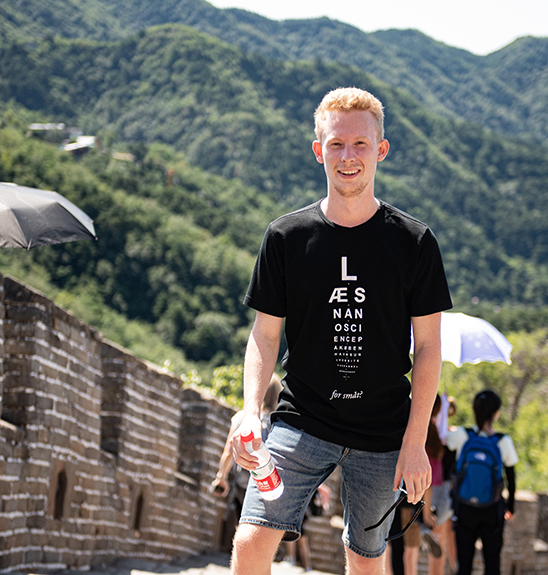Magnus Christian Wied
BA-degree:
Nanoscience, University of Copenhagen
Occupation:
Research Assistant, University of Copenhagen
QnA
Why did you choose your specific programme at SDC?
With a background in Nanoscience from my bachelor and a fondness for the interdisciplinary aspect of the field, the Nanoscience and Technology program that SDC offered, was uniquely aligned with my interests.
What are the most important academic skills/knowledge you have acquired during your master’s?
During my master’s I believe that the most important competencies I have acquired are the abilities to draw on and link methods and techniques from different fields of science and being able to communicate concepts and findings to people with different scientific backgrounds.
What have you otherwise learned?
One of the main things that I have learned is how to navigate collaboration with people from different countries and cultures.
What is the study environment like?
The Nanoscience and Technology courses all revolve around group work, which I really liked. This was also an excuse to get to know everyone better and there’s a lot of support during long days of studying.

What is it like to live in China?
I had a great experience living in China. For me the main challenges were probably navigating all the bureaucracy and paperwork related to this, combined with the language barrier. But these things were not that difficult to overcome.
What do you think about the physical environment of SDC?
The highlight for me was the multitude of sports facilities that were on campus. There’s a swimming pool, badminton courts and a gym, to name some and going for a run around campus with a view of the Great Wall of China is pretty cool.
What is the social life like?
There’s a great sense of community on campus and everyone is open to making new friends, both international and Chinese students. This is also strengthened by the different student driven groups, that are created during the year. These include a group for organizing parties, a yoga group and a hiking group.
What did you do in your spare time?
Most of my weekends were spent going to Beijing to explore the city and see the sights. During the holidays I had the opportunity to travel to places like Shanghai and Taiwan.
Where did you intern/work on thesis project and what did you gain from it?
I did my thesis at the University of Copenhagen in Kirsten Jensen’s group, where the research concerns structural determination of materials. Since the structure of a material determines its properties, this can assist in the design of new materials for batteries or catalysis. Here I learned a lot about structural characterization and how changes in synthesis can affect the final properties of a material. I think the most valuable lesson during working on my thesis was how to manage a larger project that spans a year and how to structure my work.
Would you recommend others to choose the programme?
Definitely! The way the Nanoscience and Technology program is structured, you get leading experts from both Denmark and China teaching you the specifics of their respective fields of science. In addition to this, having the opportunity to live in China for a year and experience the people and culture is amazing.